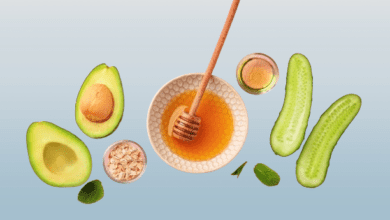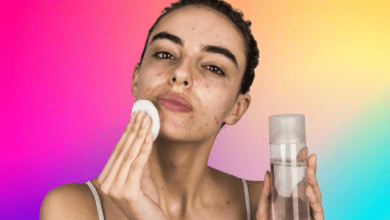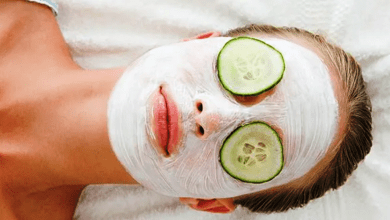How to Get Clear Skin Fast: Proven Tips

Acne and blemishes cannot be instantly cleared, but there are some tactics that can help: washing frequently, avoiding touching the skin or popping pimples, and using products that are appropriate for the person’s skin type and the particular issue at hand.
People who have blemishes or acne typically have dry, oily, or combination skin. There are many skincare guidelines available for various skin types, in addition to general guidelines that people can attempt.
For more guidance, anyone who is unsure about their skincare regimen should speak with a dermatologist.
Continue reading for advice on general skincare as well as advice for those with combination, oily, or dry skin types.
General guidelines for skincare
People who want clear skin quickly might want to try these general suggestions.
Do not pop zits.
A pimple is a sign of bacteria, sebum, and oil accumulation. It also indicates that the body’s own healing process is at work.
This healing process is interfered with by popping the zit. Furthermore, the liquids that are released expose the nearby skin to the same bacteria, which raises the possibility of more pimples developing.
Permanent scarring could also result from the exposed pimple. Steer clear of popping pimples whenever you can. Keep the area tidy if they drain.
Shower twice a day, and once more after perspiring.
It is advised by the American Academy of Dermatology that individuals wash twice a day, and then again after perspiring.
It is best to wash the skin as soon as possible after sweating because leaving perspiration on the skin and letting it dry can exacerbate acne.
Don’t touch your face.
Hand contact with the face can cause breakouts by transferring bacteria, oils, and debris onto the skin. Keeping your hands off your face can help avoid this.
Hydrate
After a daily face wash, moisturizing is beneficial for all skin types. Maintaining a moisturized face may help reduce sebum production and shield it from environmental damage.
The best moisturizer for each individual will differ based on their skin type. To find out what moisturizers are best for them, anyone should speak with a dermatologist.
Certain types of moisturizers that they might suggest are noncomedogenic, or that do not clog pores, and oil-free moisturizers.
Wear sunscreen at all times.
UV (ultraviolet) radiation from the sun harms skin. When going outside, using sunscreen can help shield the skin from these dangerous rays.
When spending time outside, it is recommended to wear sunscreen with at least SPF 30 by the Skin Cancer Foundation. Daily use of sunscreen with at least SPF 15 can also aid in minimizing skin damage.
When going outside, it’s advisable to apply sunscreen about 30 minutes beforehand and to reapply it every two hours.
Pay attention to gentle products.
Products that are gentler can be better for skin, especially if it is sensitive. The following products may irritate delicate skin:
- Products containing alcohol
- Scented goods
- Tones
- Exfoliants
- Astringents
There are mild, hypoallergenic variations of these products. Even so, it’s crucial to check for reactions on a small patch of skin before using any product on a larger one.
Rough sponges, washcloths, and loofahs are examples of tools that might be too harsh for the skin, leading to irritation and damage. There are alternatives that are kinder, like soft cleaning brushes. As an alternative, massaging a cleanser into the face with clean fingers could help avoid further irritation.
Because bacteria can lead to further irritation or breakouts, it’s critical to make sure brushes and sponges are clean.
Remain hydrated.
The body’s cells all require water. Since skin cells are most exposed to the environment, they may be more vulnerable to the elements’ drying out effects. Water consumption throughout the day may support the health of skin cells.
Consume a balanced diet.
Consuming a diet high in plant-based foods and lean protein sources may help supply the nutrients required for healthy skin.
Eliminating particular foods, like dairy milk, may also be beneficial for those who want to maintain clear skin. A 2018 review discovered that milk and acne are positively correlated. Some people think that the hormones and growth chemicals in milk are what cause this connection.
All individuals may, however, have distinct trigger foods that exacerbate their symptoms.
Make use of natural makeup.
Makeup products have the potential to worsen breakouts. Reducing breakouts caused by makeup may be accomplished by switching to natural makeup or products made to allow pores to breathe.
It’s also critical to clean any makeup brushes or tools on a regular basis and to take off all makeup every night.
Lessen tension
Reducing stress whenever feasible is crucial. Excessive anger or emotional stress can trigger an acne outbreak or exacerbate existing symptoms.
Techniques for reducing stress include:
- Obtaining adequate exercise or regular physical activity
- Acupuncture or massages
- Taking part in relaxing activities, like breathing exercises or meditation
- Tai chi and yoga
Advice for those with greasy skin
Acne and breakouts may be more common in people with oily skin. Excessive production of sebum and potential sheen characterize oily skin.
Use a cleanser without oil.
Search for a natural, oil-free cleanser that helps remove extra sebum without aggravating oily skin in order to help people with oily skin. There are several gentle cleansers made especially for skin prone to acne.
Every day, wash your hair.
Individuals who have oily skin may also have oily scalps. Overproduction of oil can spread to the face and promote breakouts. Daily hair washing, or washing more frequently than usual, can help manage oil and lessen breakouts.
Make use of toner
Using a mild toner to help unclog the pores may be beneficial for those with oily skin who are prone to acne. Salicylic acid and other ingredients in products may help maintain the pH balance of the skin and unclog its pores.
Advice for those with arid skin
Less oil is naturally produced by dry skin, which can lessen the skin’s vigor. Even those with dry skin can develop acne if they use the wrong kind of moisturizer or put too much oil on their face in an attempt to mask their skin’s natural oiliness.
Here are some pointers for taking care of dry skin.
Look for a moisturizing product that is mild.
Dry skin requires moisture, but it’s critical to locate a moisture source that doesn’t clog pores. Some people may discover that natural oils like coconut, olive, or argan oil work well for their skin.
Use mild cleaning agents.
It is particularly crucial for those with dry skin to find a mild cleanser that doesn’t remove their natural oils from their skin. To determine which gentle cleanser is best for their skin type, a person may find it most effective to consult with a dermatologist.
Steer clear of hot water.
The skin may become dry or damaged after taking a bath, shower, or washing your hands and face in extremely hot water. If you notice that your skin feels dry after taking a bath, try using lukewarm water instead.
Advice for those with combination skin types
In addition to more oily areas like the T-zone, people with combination skin also need to take care of dry patches on their skin. The T-zone forms a T shape, extending from above the eyebrows down the nose to the chin.
Think about using two face wash products.
It can be difficult to cleanse your face if you have combination skin. While some people might find that using a cleanser meant for oily skin works well for them, others might find that it dries out certain areas of their skin too much.
For those with combination skin, washing the face with a mild cleanser in general and any oily areas with an oil-reducing cleanser afterwards may help keep the skin in balance.
Make use of blotting papers.
Blotting papers can help temporarily balance and manage combination skin by drawing attention to oily areas. It might also aid in preventing the overproduction of sebum that causes breakouts of acne in these regions.
Frequently requested inquiries
These are some common inquiries concerning skincare.
How can someone naturally achieve clear skin?
Using natural makeup products, moisturizing, and routinely washing with mild cleansers are some of the natural treatments for clear skin. Drinking plenty of water and avoiding foods that might cause breakouts might also be beneficial.
How can one achieve clear skin in a single night?
Acne and pimples might not go away in a single night. Nonetheless, using a noncomedogenic, oil-free moisturizer and cleansing the face gently before bed may be beneficial.
In brief
Numerous methods are available for people to try at home in order to achieve clear skin.
What works best for each individual will depend on their skin type. Using mild cleansers, moisturizing, and frequent washing could be beneficial. A person may benefit from medicated products in certain situations.




